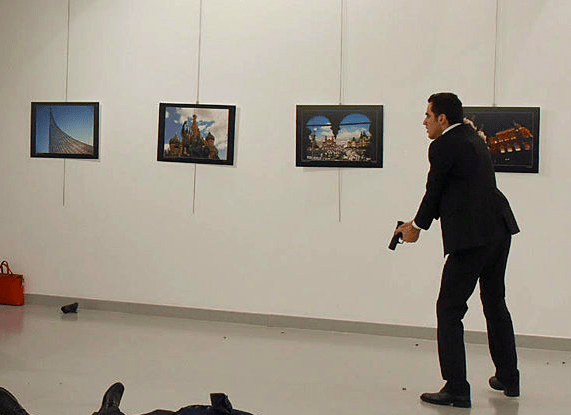They say a picture is worth a thousands words. The one of an off-duty police officer standing triumphantly over the body of Russia’s ambassador to Turkey in Ankara, says so much more. On what was due to be an ordinary evening in the Turkish capital, Andrei Karlov attended a photo exhibition to make a few remarks at the opening of a collection entitled ‘Russia as seen by Turks’. They turned out to be his last. As he addressed the small crowd, nothing seemed out of the ordinary. The 62 year-old was, as you’d expect of a man of his status, flanked by men in suits. Little did anyone expect that one of the suits would open fire and kill him.
Captured on camera, the gun fire can be heard before ambassador Karlov falls to the ground. As the lenses pull out, his assassin, named as Mevlut Mert Aydintas, aged 22 and a member of the Ankara riot police, is seen shouting. ‘Allahau Akbar’, he is reported to have said, before apparently saying: ‘Don’t forget Aleppo, don’t forget Syria’. A short time later, it was confirmed the shooting was fatal.
While many questions are being asked about the assassination of Russia’s ambassador, the most important surrounds not the act itself, but the impact it may have on the fractious relationship between these two neighbouring countries. In the last 13 months, the friendship between Russia and Turkey over Syria has been on ice so thin, both sides have suffered frostbite. These ‘friendly neighbours’ backed opposing sides in the Syrian conflict and at times that’s led to direct conflict, including in 2015 when Turkey shot down a Russian warplane on its border. Diplomatic ties were cut. As, too, were economic ones – nearly starving entire sectors of Turkey’s economy, until President Erdogan grovelled to Vladimir Putin.
With the tensions put behind them, the two presidents have been forging their own solution to the Syrian conflict, reaching a deal within the last week to allow people to leave Aleppo as Assad’s forces regained ground. The question now is whether the fulfilment of this deal, and others potentially in the works in Syria, could now be unpicked by the actions of one man.
Security is already high in Turkey. In the last two weeks, the country has suffered two big attacks: one at a football stadium in Istanbul, the other in the central Anatolian city of Kayseri. So how did a police officer, who was a member of the Ankara riot squad, end up standing a few feet behind the Russian ambassador where he was able to shoot him dead?
Putin has already described the death of ambassador Karlov as an act of ‘provocation’. Turkey’s Erdogan has too condemned the shooting, with the country’s foreign ministry saying what happened was a ‘lowly terrorist attack’. But is it all a little too late? Russian lawmakers are already investigating and say after the probe they will have a clearer idea of how this may impact bilateral relations. What the lawmaker failed to address was the more important ‘trilateral relations’ ahead of further discussions over Syria, which are due to take place today.
Syria is in turmoil. It needs a solution to end the constant violence that has killed an estimated half a million people and displaces many millions more. The deal recently reached by Russia and Turkey had been seen as key turning point. Now that, too, could hang in the balance after the actions of Aydintas.
Both sides suggest they will work together to pinpoint the reason behind the assassination. But a wrong move by either party could put the whole deal in jeopardy. And Aydintas’s attack comes after a groundswell of protests in Turkey aimed at Russia and its involvement in Syria. Though it’s not yet clear whether Aydintas was a lone wolf or part of a bigger plot, what is certain is that Turkish sentiment towards Russia is no longer warm and fuzzy.
Many people lost their livelihoods during the last spat. While the two presidents have kissed and made up, a large portion of Turks are not so keen to once again embrace their Russian neighbours. So while Erdogan may work hard to keep Putin onside, he could find himself back on even thinner ice.





Comments